Something very interesting (and relevant to OLTD 505) happened a few hours ago on Twitter that hit very close to my heart.
Some of you may be familiar with the stellar podcast Welcome to Nightvale (WTNV) (http://commonplacebooks.com/) created and co-written by Joseph Fink (@PlanetofFinks on Twitter). If you aren’t familiar, I won’t go into details, but the podcast is (in my opinion) and exceptionally well written and well produced story in a style reminiscent of H. P. Lovecraft. The podcast is free to download, with no commercials except for plugs for their donation page, plugs for their guest musicians, and plugs for their merchandise at the beginning and sometimes end of the show. I’ve been a big fan for well over a year.
A few hours ago, Joseph Fink posted this on Twitter (edited for language):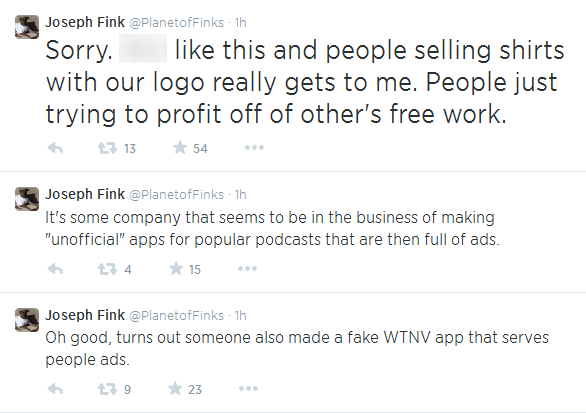
This is interesting for a few reasons. First, the initial reactions of fans:
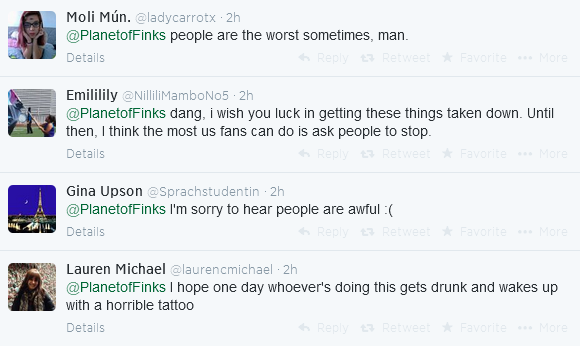 (especially that last one).
(especially that last one).
Secondly, the conversations the fans of the podcast had after the initial reaction phase was over. I’ve selected a snipet below (orange boxes on the comments I found most engaging):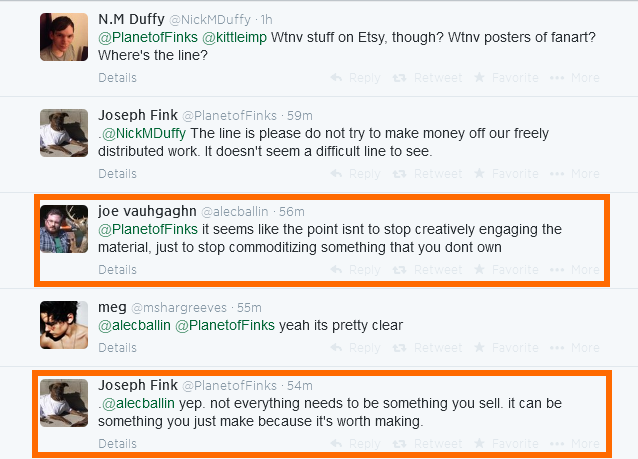 I really, really like the comment by @alecballin above. I think that this encapsulates my ideas about remixing and read-write culture pretty well. I also really like @PlanetofFinks response – he agrees. This is a case of someone creating something and being perfectly happy for fans to engage with it through art and remixes. He just doesn’t want other people to “cash in” or sell things based on his creation. Which makes the following comment all the more aggravating:
I really, really like the comment by @alecballin above. I think that this encapsulates my ideas about remixing and read-write culture pretty well. I also really like @PlanetofFinks response – he agrees. This is a case of someone creating something and being perfectly happy for fans to engage with it through art and remixes. He just doesn’t want other people to “cash in” or sell things based on his creation. Which makes the following comment all the more aggravating: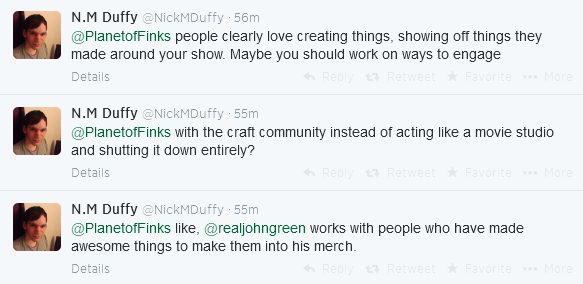 @PlanetofFinks is not “acting like a movie studio”. I’m not sure if the above fan had read the rest of the conversation, so I’ll resist the urge to make a comment on his reply to the thread. Instead, I wanted to comment on the spirit of his post – content creators engaging with the craft community. WTNV features a grassroots level musician EVERY episode in a special segment called “The Weather”. They have also have guest voices and guest writers (some of which, to my understanding, were fan scripts). I’m not sure who designs their merchandise, but I would be surprised if none of it was designed by their fans. WTNV, and other fan supported podcasts (“We’re Alive” [http://www.zombiepodcast.com/] is another remarkable example) generally take special care to engage with their fans and fan products, or they wouldn’t get the support they do. That doesn’t mean that fans should be allowed to create something and then sell it for profit at conventions or over the internet however. Unless of course …
@PlanetofFinks is not “acting like a movie studio”. I’m not sure if the above fan had read the rest of the conversation, so I’ll resist the urge to make a comment on his reply to the thread. Instead, I wanted to comment on the spirit of his post – content creators engaging with the craft community. WTNV features a grassroots level musician EVERY episode in a special segment called “The Weather”. They have also have guest voices and guest writers (some of which, to my understanding, were fan scripts). I’m not sure who designs their merchandise, but I would be surprised if none of it was designed by their fans. WTNV, and other fan supported podcasts (“We’re Alive” [http://www.zombiepodcast.com/] is another remarkable example) generally take special care to engage with their fans and fan products, or they wouldn’t get the support they do. That doesn’t mean that fans should be allowed to create something and then sell it for profit at conventions or over the internet however. Unless of course …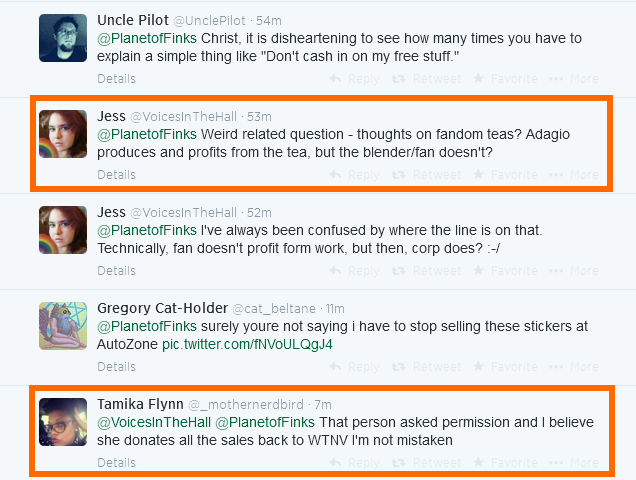 … they have permission and kick some of the profit back to the creator.
… they have permission and kick some of the profit back to the creator.
This is where my feelings toward remixing and fan creations get complicated. Do I believe that fans of a free service, who are inspired and create something new, should profit off of it? No … and yes. When I contrast the above example to that of Girl Talk (http://illegal-art.net/girltalk/) from RIP: A Remix Manifesto (http://vimeo.com/8040182), I get myself into murky waters. Girl Talk remixes songs, without clearing copyright. Is that really all that different to fans profiting from their art or other products based on WTNV? In my heart, I don’t think so.
My difference of opinion comes from a feeling more of what is reasonable, versus what is necessarily “right”. If Girl Talk were to pay to clear copyright on his album, he is looking at a bill of about $4.2 billion according to RIP. Is that reasonable? I don’t think so. If the rights holders (and in this specific example, record labels) dropped the cost of sampling, I would be much less divided on Girl Talk. If it was economically reasonable to sample, I would want those samples to be cleared before I considered calling myself a fan (which I am).
On the other hand, companies who create apps or fans who create products based on WTNV and profit from them don’t have to pay ridiculous copyright fees. There are no fees associated with accessing WTNV (unlike music), and some people are taking that to mean it is open to use for commercial purposes.
This brings to mind the conversations we have had on “free” versus “open” material. I am fully aware what I’m talking about in the case of WTNV is “free” and NOT “open” content, but it is interesting to note how blurred those lines can be in the minds of media consumers today. I believe that blurring is due, in large part, to people beginning to dismiss the unreasonable barriers to the use of media, and applying those attitudes to all media – not just commercial media.
It must very be difficult to be a creator of new media today. Clearly, I have mixed feelings about all of this, and much like the registrar of copyrights said in RIP “it depends on whose it is an how upset they are”. In the case of the fans of WTNV, the fact that content is free gives those of us who are fans (and those of us who donate to the show) a small sense of ownership as well – and we will support the creators as much as possible. Much like @NilliliMamboNo5 said above “I think the most us fans can do is ask people to stop.”



 @PlanetofFinks
@PlanetofFinks
